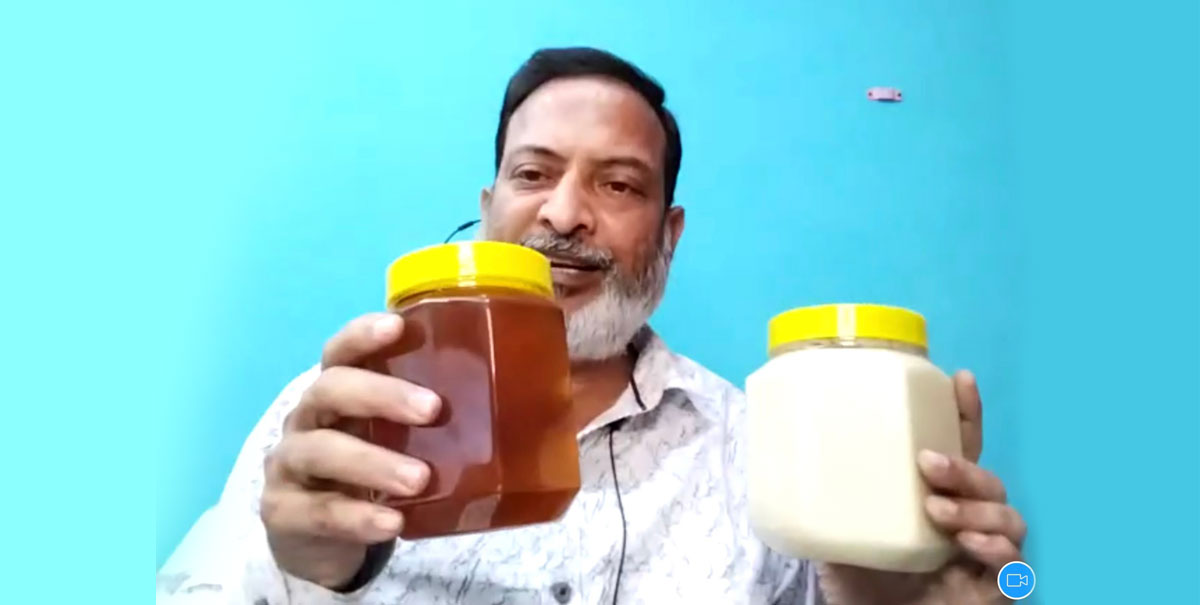
“Honey has been used as a super food for centuries. Was it processed, filtered or heated in those days? No…so why is processing required now and is your ‘processed’ honey truly pure?”questioned Mukesh Pathak, beekeeper and founder of Faba Honey, while speaking at a webinar organised by Moneylife Foundation.
While honey is considered to be a natural sweetener that has numerous health benefits, it is also a product that has been widely adulterated with rice and corn syrup. “Big brands buy honey from farmers like us, heat it, filter it and process it by adding chemicals to achieve a consistent colour and in the process also add rice or corn syrup before it gets labeled and sold as pure honey,” he explained while talking about the difference in branded and natural raw honey.
Honey is a naturally occurring product that bees create by pollinating and collecting nectar from flowers of various plants such as lychee, ajowan caraway (ajwain), Java plum (jamun), mustard, wild acacia and others. Honey created from the nectar of different of flora is not only visually different, but also has a subtle difference in taste. However as Mukesh explained in his talk, “labelling which flora a particular bottle of honey comes from is not mandated by the food safety regulator, so none of the big brands ever mention which flora their honey originates from.”
Branded honey is always consistent in appearance and viscosity, with the same colour and taste in all of their bottles. This as Mukesh explains can only be achieved by a consistent method of processing and adding unwanted chemicals to the naturally occurring product. During his talk, he displayed the difference in appearance of honey collected from bees that pollinated particular flora, emphasising that naturally occurring honey is never consistent in colour or taste, and that consistency is only achieved by processing.
Mukesh also emphasized that while processing was not necessarily bad, it is important for a consumer to understand what is done to naturally occurring honey in the name of processing. “The common belief that crystalline honey is impure is incorrect, as honey naturally crystallizes. However due to this misinterpretation, manufacturers chemically modify and process natural honey to maintain its liquid form, and this process often involves heating the honey. However, if honey is heated beyond 60°C it loses its medicinal properties. Naturally occurring antioxidants, enzymes, vitamins are all destroyed beyond this temperature,” he explained.
Mislabeling honey as natural, pure or organic is also a widespread problem that has not been addressed effectively by the food safety regulator. As Mukesh explained, “Certain percentage of rice or corn syrup is allowed to be mixed in natural honey and allowed to be sold as 100% natural honey. While logically this is incorrect, the FSSAI permits this type of adulteration up to a certain percentage. So when products as labeled as natural or pure honey, how pure are they truly?”
Adulteration in branded honey is often designed to bypass food safety standards and it is not something that can be detected with purity tests conducted at home, believes Mukesh. During the talk, he advised people to avoid home purity tests that are popularly shared in YouTube videos, because only a test conducted through a verified laboratory will correctly identify adulteration in honey.
Mukesh also answered questions from concerned attendees during the webinar. One such question was about brands selling different flavours of honey and whether this meant that the honey was collected from bees pollinating such flowers. In response, Mukesh warned consumers that most such flavoring is just addition of an artificial essence to the honey, as is this the case with cinnamon flavored honey. “Cinnamon does not flowers which can be pollinated by a bee, so when you see a cinnamon flavored honey bottle, know that it is been artificially flavoured and not natural,” he advised.
Answering a question on the negative effects of introducing genetically modified (GM) seeded plants and crops in an environment on the bee population, Mukesh said, “Decades ago, bees used to pollinate and collect nectar from sunflowers in India. This is not the case today, as GM sunflowers are now prevalent across India and bees do not seem to pollinate such GM plants. This is also the case with eucalyptus. So if we continue to introduce GM seeds, the bee population is bound to decline rapidly and perhaps even become extinct. Around 80% of all crops and plants across the world are pollinated by bees, so if bees becomes extinct the food supply chain will be broken and humans will certainly die of starvation in a matter of years. If GM seeds are to be introduced it should be with done by carefully considering and maintaining a balance in the profits and also with the harmful effect on the environment.”
Sucheta Dalal, founder trustee of Moneylife Foundation asked a question about the revelation a few years ago that honey sold by manufacturers often contains antibiotic contaminants, and whether this was true even today. “In the earlier days, beekeepers were not as conscious about the use of antibiotics or pesticides, but these days such practices are known to be harmful. Nowadays, beekeepers only use products that will keep their bees healthy and away from harm. I personally keep my farm as close to a jungle as possible, so that external elements as eliminated. In my opinion, consumers should realise that antibiotics or pesticides are present in almost all food products, it is the percentage at which it becomes detrimental to your health which is important.”
The session was attended by many on Zoom, and Moneylife Foundation’s YouTube and Facebook channels. A video recording of the session can be viewed here:



